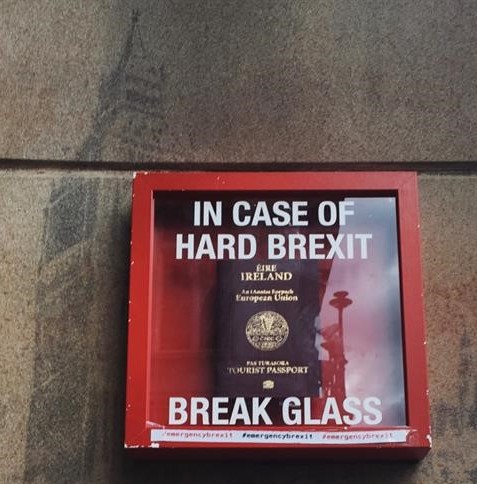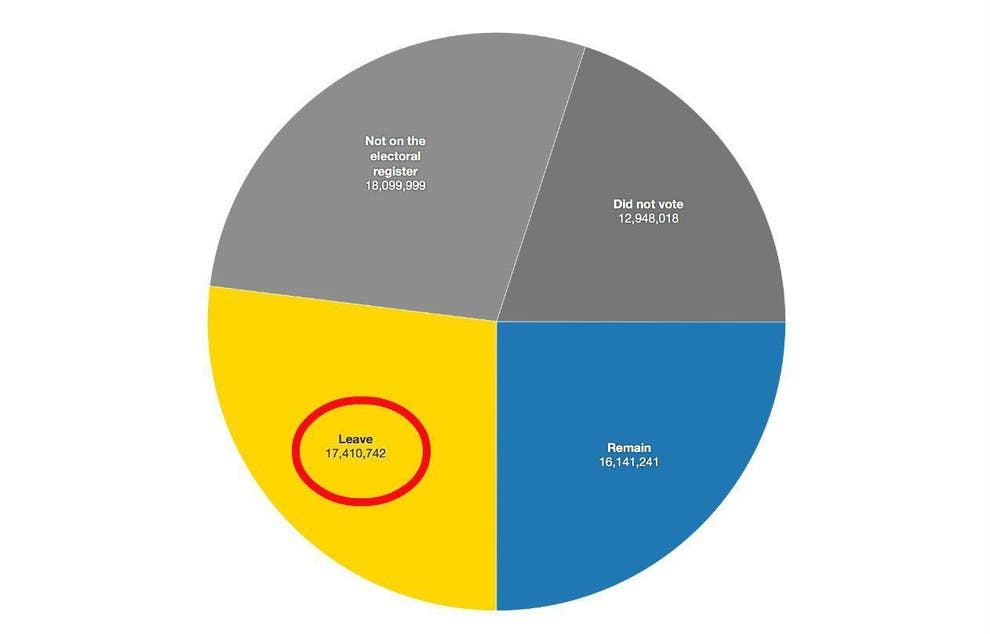
You really want to know why Brexit is a shit-show? Two broad reasons:
1 It’s an economic decision taken for non-economic reasons; and
2. Not enough people voted for it in the first place. It simply does not have sufficient popular support.
1 It’s an economic decision taken for non-economic reasons. It was a populist decision based on emotion and irrationality and lack of knowledge. (Famously, the day after Britain voted in a referendum to leave the EU, British searches on Google for “what is the EU?” peaked.) After all, Britain has no wish to retreat into North Korean isolationism (not yet, anyway). Britain officially still is committed to free trade. Naturally, the Brexiters then pull out of the world’s biggest trading union because, emotionally, they hate the EU. Britain needs more immigrants to provide labour to various sectors in the British economy. Naturally, the Brexiters then clamp down on immigration because, emotionally, they hate foreigners; and are now reduced to sending in the army to drive lorries and <using prisoners to work in the hospitality sector>. (Hang on to your wallet in a British pub, folks.) In short, Brexit is an instance of arrested-development type emotions overriding logic at every turn. Pretty much any decision that is derived from a Brexit source will exemplify a mess of irreconcilable contradictions. And in N Ireland, the local Unionist Brexiters of the DUP party, out of an emotional desire to strengthen a (British) Union, voted against a (European) Union. Sounds almost comically dumb; is dumb. Think about it. The North of Ireland still is a place of divergent political allegiances, Irish and British. On a day-to-day basis, without anyone saying too much about it, these had largely ceased to matter, since common British and Irish membership of the EU afforded an over-arching soft identity and polity that allowed trade and theoretically-divergent political aspirations and identities comfortably to mingle and to co-exist. Continuing EU membership meant that the Irish community in the North of Ireland, who are in theory opposed to to a union with Britain, were nonetheless de facto increasingly comfortable with continuing in a union with Britain. Free movement of goods and people meant that the border had in practical terms ceased to matter. While many pro Irish unity folk would always of course say (if questioned about it) that they would like a united Ireland at some indeterminate point in the future, privately they would admit that there were now no obvious downsides to being in the UK either. In that way, for most of the Irish community North of the Irish border, Irish unity had been relegated to a manana project. Increasingly, whatever about their political theory, in practice, Sinn Féin (the pro Irish unity party in the North of Ireland) were de facto committed to making N Ireland work. The DUP simply weren’t shrewd or perceptive enough to realise this massive step-change in pro Irish unity real world thinking. Instead, in an error of catastrophic proportions for the North’s British Unionists, the reliably-choleric DUP knee-jerked emotionally and blindly to their opponent’s sacred cow mantras, and to their opponents’ actions from 40 years earlier, while failing utterly to realise the surprisingly pro-Union (with GB) de facto nature of their opponent’s current working realities. From a pro-union with GB perspective, it was an unforgivable error. One of the first rules in any competitive situation, whether it’s in business or in politics, is that you must know your opponent. What do they say they want? What do they really want? What are they happy to live with? What is their bottom line? What matters to them, and why? Obviously, that level of knowledge obliges you to think with a cold head, to think rationally and strategically, to treat your opponents with a serious amount of respect, and be prepared to adopt a satisfactory compromise position. Very obviously, the absolutist DUP has shown itself entirely devoid of any of those capabilities. Unfortunately for the DUP and for Brexiters in general, hampered as they are by half a century of cultural apocalypticism and a simplistic, proto-Trumpian, binary solution mindset, their knowledge of N Ireland’s pro-Irish unity community’s real day-to-day priorities and motivations is unforgivably poor, and seemingly derives largely from their own cartoonish and outdated stereotypes, and from their own fears and fevered imaginings. Their ability to formulate nuanced and far-sighted strategy in their own political interest seems largely absent.
As this <perceptive article> by the London School of Economics notes:
“Brexit has made a united Ireland – though far from inevitable, and, according to some polls, only at the margins – an increasingly immediate and concrete proposition … Brexit has left the party in a position of political strength unprecedented in its history, and its primary policy goal of Irish unity closer than at any time since Ireland was partitioned 100 years ago.“
However, any eejit could have foreseen that much (although, as noted above, some DUP eejits certainly didn’t) – the really interesting bit is what that LSE article then notes:
“However, far from having viewed Brexit as a wedge issue, to be leveraged in the pursuit of constitutional transformation, we have found that it has instead been overwhelmingly viewed within Sinn Féin as a threat to be managed. Especially in its potential to disrupt the openness of the Irish border, Brexit has represented grave political, economic, social and existential risks, which have been most acutely felt by nationalist voters in sections of Sinn Féin’s core constituency, including in the border counties and multiply deprived communities in Belfast and Derry. Throughout the Brexit process between 2016 and 2019, the party was principally concerned with contesting Brexit policy rather than with using Brexit as an opportunity for polity contestation. As one former Sinn Féin MLA neatly summarised: ‘We are in this dilemma that actually the harder Brexit is, I suspect, the more support there will be for a United Ireland. But despite that, we are trying to mitigate or ameliorate the worst aspects of Brexit.‘”
That’s the un-recognised real-politik of Sinn Féin in 2021. Despite being in theory working for a united Ireland, they’re nonetheless trying to make the North work. They know well that their voters will no longer stand for anything – be it bombs or unhinged political policies such as Brexit – which interfere with people’s day to day economic prospects.
The contrast with Unionism, which is in theory supposed to be “committed” to Northern Ireland, could hardly be any more stark. In 2019, the DUP leader, Sir Geoffrey Donaldson, said that he “could live with 40,000 jobs lost as a result of Brexit“. What sort of headcase politician says that? What sort of voters even allow a politician to say that without electoral consequences? Gone are the days when British Unionists (as opposed to European Unionists, like me) could be said to be “more loyal to the half crown than to the crown“. These days, the DUP are a party of detached ideologues, psychologically reliant on handouts from Britain, and whose extremist fixation on a “pure” hard Brexit has put them on a collision course with local business leaders of all political persuasions. In fact, I’ve long suspected that the DUP has a vested interest in keeping NI economically weak – they view economic weakness as a defence against possible unity with the South of Ireland, as it allows them to say to the South: “unity will cost you too much“. That is, the DUP is wedded to poverty and dependency as a way to ensure that they nonetheless can continue to live under the right colour of flag. Whereas, not to mince my words here, provided it’s not rubbed in their face, many pro Irish unity folk will happily live under any damned flag provided we can get on with making a good living. As the late John Hume remarked, “you can’t eat a flag“.
Historically, from the time of Punch cartoons onwards, Britain viewed the Irish in the way that old-style sexist males viewed women, i.e., overly-emotional and unpredictable. Ironically, these days, the perma-petulant British Brexiters (count the number of times “outrage” and “fury” appears in British popular press articles about the EU – a quick Google search of “outrage daily express” pulled up no less than 17,400,000 results lol), including the DUP, are the Romantic emotional extremists, lost in a fog of “pure British sovereignty at all costs” (literally at any cost), and increasingly adrift from mundane-but-vital economic realities; and it’s the Irish who are the hard-headed realists, more concerned with the economy than with first world problems such as notional identities and fucking flags.
When Brexit happened, the DUP voted for the hardest possible Brexit. They did that out of a desire to strengthen the union with Britain; and I don’t doubt their sincerity of purpose for a moment. However, stategically, it was a spectacular own goal. Brexit makes the Union with Britain more difficult. It can’t do anything else. A vote for Brexit is a vote for more and harder borders – that’s essentially what Brexit is – more borders, more red-tape. (See <link> to article headlined “UK races to find extra 50,000 staff for post-Brexit paperwork“.)
It’s worth posing the question – in what ways did the DUP think that making the Union with Britain more difficult would strengthen the Union with Britain?
In reality, a vote to remain in the EU would have strengthened the Union with Britain. Even a vote for the half-way house Protocol, which keeps NI fully in the UK and still gives porous access to the EU, would strengthen the Union with Britain.
In short, anything which makes cross-border economic and social life easier for NI’s pro Irish unity population strengthens the Union with Britain.
However, the DUP’s rationale, if one could call it that, seems to have been: “Let’s piss off the pro united Ireland population as much as possible; let’s make NI difficult and unworkable for them; that’s bound to convince them of the merits of the Union with GB!” The DUP failed completely to realise that many in the pro Irish unity camp were de facto in the pro Union with Britain camp already. That is, the DUP based its strategy on what it thought its opponents were, as opposed to what they actually were. As an analysis failure, as a policy failure, that takes some beating; and is explicable entirely by the DUP’s comfortable bigotry which ensures that it views its political opponents through the narrow prism of its own ingrained prejudices, and acts accordingly, generally taking the wrong option every time.
This ability to paint themselves into corners (and then to blame the paint-brush) is irrational to an extent that almost defies explanation. The DUP’s Brexit antics derive from a tedious mix of self-pity, white cultural nostalgia, impotent rage and chronic insecurity. The DUP’s Brexit “policy” is a perfect example of how to cut off your nose to spite your face.
Sadly, internationally, and within England, it’s generally not recognised just how unrepresentative the DUP are of the majority of people in the North of Ireland. Not only do the DUP not represent the Irish community in the North of Ireland, they don’t even represent all of the British community in NI either, and this is especially true of the British community who live away from Belfast, closer to the EU border.
Recently, leading Belfast Brexiter, Jamie Bryson, brought a bus-load of Brexiter bandsmen and assorted yahoos to Enniskillen (a rural town near the EU border) for a “massive show of strength against the Protocol“. Fermanagh is a county with lots of Unionist people, so Jamie thought he was on to a winner. However, hardly anybody showed up, and egg-on-face Bryson was left sermonising to his bussed-in rent-a-mob while sensible local Unionists ignored them in their droves. So much for Boris Johnson’s government’s b/s about “community tensions“.
In that context, it is instructive to read an <editorial> in Co. Fermanagh’s main pro-Union (with GB) newspaper, The Impartial Reporter. It’s much more reflective of a pragmatic border (GB) Unionist view of Brexit / the Protocol:
“Everything changed with the peace process and the Good Friday Agreement and movement back and forth became easier; indeed better than ever and people returned to a more normal life. People just want to get on with their lives and we’ve become used to it.
The impact that the previous Border had for decades was enormous. It would be madness to go back to the Border of the past with all its difficulties.
Yet, one gets the impression that Jamie Bryson and Jim Allister would quite welcome such a scenario here, whatever the inconvenience for people in this area. Bryson, according to Twitter found the journey to Enniskillen “quite the trek” and was thankful for a SatNav. He’s distant from the problems here.
This smacks of a sense of entitlement from a certain constituency of loyalism, which hasn’t quite grasped the changes which have taken place in Northern Ireland, both in terms of the demographic and the attitudes, particularly among younger people that the old symbols of past division aren’t as relevant to modern life for them as they were.”
The above is a take on Brexit and the EU from a Northern Irish British Unionist. It’s a million miles away from the cynically-hyped and over-stated “unrest” and “disruption” hyperbole of the DUP and Mr. Johnson’s Brexit organ grinder’s monkey, Lord Frost. That pragmatic viewpoint is widely shared between the British and Irish communities in NI, and especially by people West of the Bann, people who would have to live with the border fallout from the British government’s unprincipled chicanery. It’s galling to listen to the British government claiming to “represent” NI. They do not. With half an an eye on throwing some red meat to their reliably EU-hating base (as a way to distract from the as yet un-materialised “benefits of Brexit” – whatever they might amount to), the British government is merely using the North, and hyped-up concerns about the role of the ECJ (a complete non-issue in NI), respectively as a pawn and a distraction in a cynical Brexiter spat with the EU. Johnson, or the traditional East of the Bann British Unionists, or the careerist top brass of the DUP? None of them give a flying fuck about the everyday lives and prosperity of people affected by the border.
That’s all depressing enough. But there is another fundamental reason why Brexit is failing. Not only is it intrinsically a stupid thing to do (a Western, supposedly “free trade”, democracy voting for less free trade? Seriously?), the reality is that not enough Brits ever supported it anyway.
2 Not enough voters voted for Brexit. See:

The above is partly why it’s such an ongoing balls-up. 3/4 of the UK didn’t even vote for it. “Will of the people“, my foot.
Ideally, you’d never have a referendum. They are a crude import from an entirely different system (a plebiscite democracy), and have no place in a representative democracy,
And as Margaret Thatcher (quoting Clement Attlee) noted: “Perhaps the late Lord Attlee was right,” she observed, “when he said that the referendum was a device of dictators and demagogues.”
Hear, hear. But if you insist on having one of those wretched modern degenerations into governance by panem et circenses, there should at least be a mandatory supermajority (of at least 75%), and there also should be compulsory voting (fine lardy-arsed non-voters via PAYE or in their benefits) to get above (e.g.) a 75% turnout.
Absent those conditions, it’s just a recipe for endless division – civil war without guns. England, like America, is now a nation divided, primarily fighting with itself. This is no good for anyone, neither Britain itself, nor its long-suffering neighbours. Britain, like Ireland, through political cowardice and expediency, has allowed the alien governance concept of populist “referendums” to infect the body politic in both countries, and Britain is now reaping the predictable harvest. A recent <survey of social attitudes in Britain> reveals that the country is now split in an unprecedented manner:
“Brexit is in a different category of political identity to mere party allegiance, and the voters’ devotion to their 2016 vote has something of the quality of religious, cultist fervour, infused with patriotic ardour. By the looks of it, it will last for decades, and the wounds are not going to heal.
Politically, this suits the Conservatives, who can exploit the issue and rerun the 2019 election endlessly, but in the longer run demographics will work against them. Older Leave votes will die off and the younger, pro-EU cohorts will form a more and more substantial pro-EU majority – because they seem unlikely to ever get used to Brexit, or reconciled to the events of 2016. The Remainers will morph into Rejoiners, not reluctant Brexiteers.”

You must be logged in to post a comment.